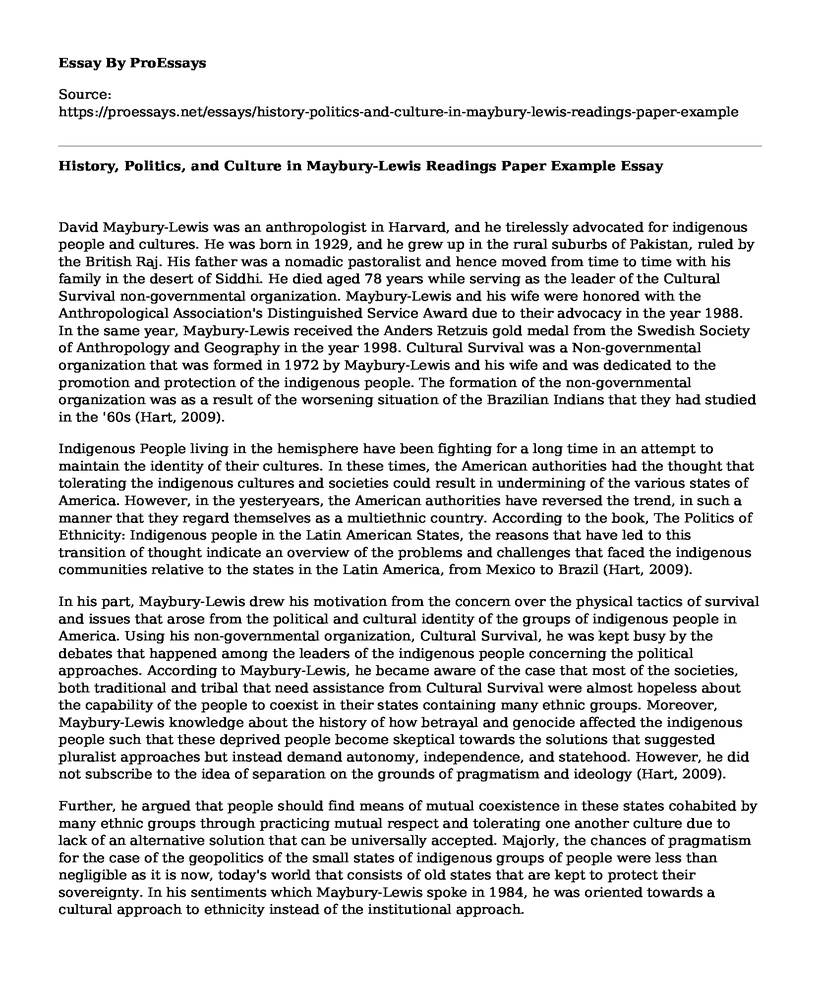David Maybury-Lewis was an anthropologist in Harvard, and he tirelessly advocated for indigenous people and cultures. He was born in 1929, and he grew up in the rural suburbs of Pakistan, ruled by the British Raj. His father was a nomadic pastoralist and hence moved from time to time with his family in the desert of Siddhi. He died aged 78 years while serving as the leader of the Cultural Survival non-governmental organization. Maybury-Lewis and his wife were honored with the Anthropological Association's Distinguished Service Award due to their advocacy in the year 1988. In the same year, Maybury-Lewis received the Anders Retzuis gold medal from the Swedish Society of Anthropology and Geography in the year 1998. Cultural Survival was a Non-governmental organization that was formed in 1972 by Maybury-Lewis and his wife and was dedicated to the promotion and protection of the indigenous people. The formation of the non-governmental organization was as a result of the worsening situation of the Brazilian Indians that they had studied in the '60s (Hart, 2009).
Indigenous People living in the hemisphere have been fighting for a long time in an attempt to maintain the identity of their cultures. In these times, the American authorities had the thought that tolerating the indigenous cultures and societies could result in undermining of the various states of America. However, in the yesteryears, the American authorities have reversed the trend, in such a manner that they regard themselves as a multiethnic country. According to the book, The Politics of Ethnicity: Indigenous people in the Latin American States, the reasons that have led to this transition of thought indicate an overview of the problems and challenges that faced the indigenous communities relative to the states in the Latin America, from Mexico to Brazil (Hart, 2009).
In his part, Maybury-Lewis drew his motivation from the concern over the physical tactics of survival and issues that arose from the political and cultural identity of the groups of indigenous people in America. Using his non-governmental organization, Cultural Survival, he was kept busy by the debates that happened among the leaders of the indigenous people concerning the political approaches. According to Maybury-Lewis, he became aware of the case that most of the societies, both traditional and tribal that need assistance from Cultural Survival were almost hopeless about the capability of the people to coexist in their states containing many ethnic groups. Moreover, Maybury-Lewis knowledge about the history of how betrayal and genocide affected the indigenous people such that these deprived people become skeptical towards the solutions that suggested pluralist approaches but instead demand autonomy, independence, and statehood. However, he did not subscribe to the idea of separation on the grounds of pragmatism and ideology (Hart, 2009).
Further, he argued that people should find means of mutual coexistence in these states cohabited by many ethnic groups through practicing mutual respect and tolerating one another culture due to lack of an alternative solution that can be universally accepted. Majorly, the chances of pragmatism for the case of the geopolitics of the small states of indigenous groups of people were less than negligible as it is now, today's world that consists of old states that are kept to protect their sovereignty. In his sentiments which Maybury-Lewis spoke in 1984, he was oriented towards a cultural approach to ethnicity instead of the institutional approach.
Maybury-Lewis criticized Marxist understanding of social pluralism aimed at reducing complex categories of ethnicity and culture to the socio-economic category. He intended to identify the specific types of oppression faced by the marginal groups-in Brazil under the dictatorial rule of the military-whom people feared that they were a threat to the self-identity of creating modern and total states on every side of the political divide. According to Maybury-Lewis, the major void that existed in Marxists politics was the unilinear evolutionary politics similar to Faustian modern capitalism. This unilineal evolutionism cast the fate of indigenous people's ways of life to extinction (Hart, 2009).
Maybury-Lewis advocated for the recognition of the marginalized grassroots ethnic groups of people and also called for another evaluation of the status of the term 'tribalism.' He was so definite in his unapologetic approach to the meaning of 'tribalism,' as he often used it. He would ask what would be wrong in tribalism, if according to the term, one essentially meant giving privileges to an ethnic group, or one meant the retaining of intermediate institutions that stood between the person and the government. He would ask whether the ascriptive identity different from that of a family, which is assumed to be significant factor that contributes to the security of human beings. He continued to argue that the ethnic group's persistence in these unfriendly states was an indication of the fulfillment of crucial human needs that cannot be satisfied otherwise (Hart, 2009).
Conclusion
Maybury-Lewis was committed to diversification of culture, and he expressed his discontentment to the pretensions of all-inclusive modernism. The nation's state was not rational in its ideologies, and the country of ethnicity was demonized, which was in contradiction to the de facto case whereby the state makes minority communities disappear (Hart, 2009).
References
Hart, L. (2009). Popular Anthropology and the State: David Maybury-Lewis and Pluralism. Anthropological Quarterly, 82(4), 1033-1042. Retrieved from http://www.jstor.org/stable/20638679
Cite this page
History, Politics, and Culture in Maybury-Lewis Readings Paper Example. (2022, Nov 07). Retrieved from https://proessays.net/essays/history-politics-and-culture-in-maybury-lewis-readings-paper-example
If you are the original author of this essay and no longer wish to have it published on the ProEssays website, please click below to request its removal:
- Essay on Dangers in Police Realized As They Die In Line of Duty
- Corruption Annotated Bibliography
- Not for Sale: The Return of the Global Slave Trade and How We Can Fight It
- Saint Elizabeth (1271-1336) Essay Example
- Greek Mythology: Trojan War Essay Example
- US Customs: Petty Bribery and Unethical Practices - Essay Sample
- Essay Example on Vonnegut's Slaughter House Five







